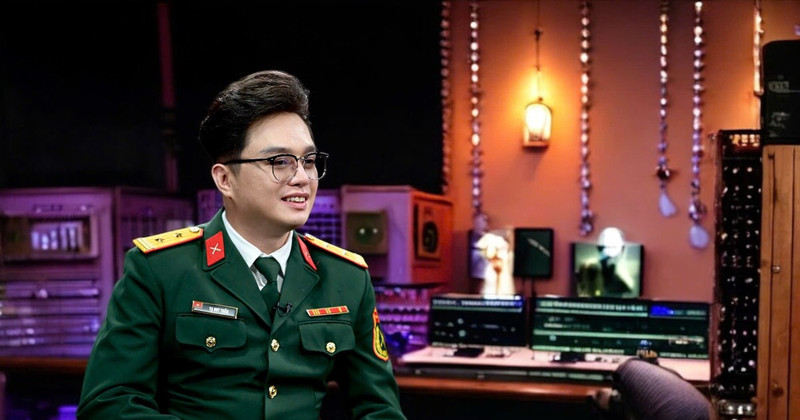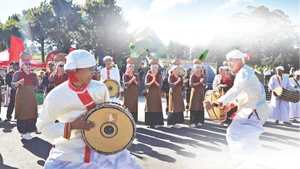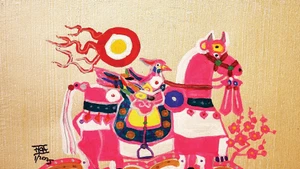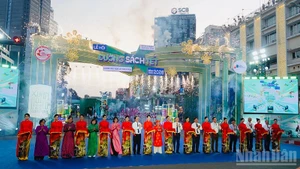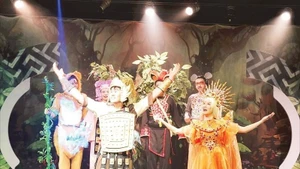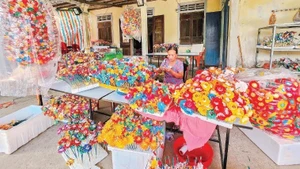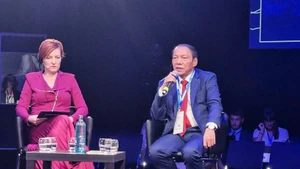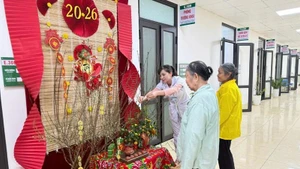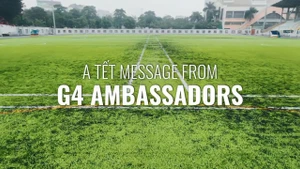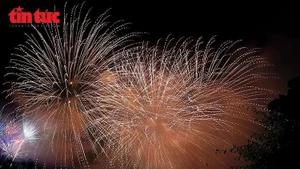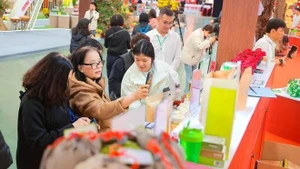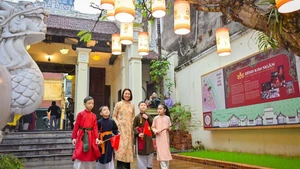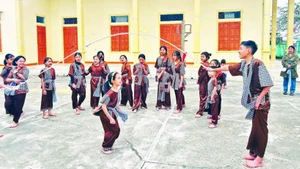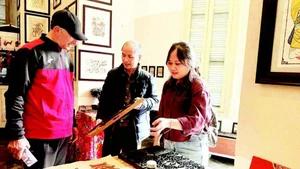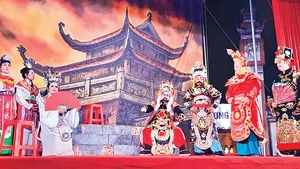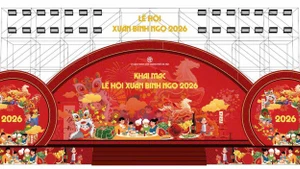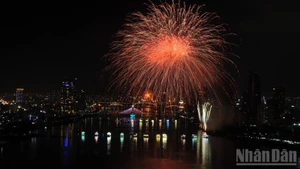Modern resonance blended with traditional elements
Q: Congratulations on your recent two B prizes at the 2020–2025 Literary, Artistic, and Press Composition and Promotion Awards on the Armed Forces and Revolutionary War, presented by the Ministry of National Defence. These awards recognised your music in two dance works themed on the revolutionary war. Previously, your song “We Love President Ho Chi Minh” was also honoured with a Certificate of Outstanding Expression on the theme of “Studying and following the ideology, morality, and style of President Ho Chi Minh” by the General Department of Politics of the Viet Nam People's Army in 2024. What led you to pursue this theme and achieve such success?
A: In fact, when I first started composing, I focused on themes of love and personal reflection. However, my artistic path gradually shifted.
Since joining the Military Music and Dance Theatre, I have come to better understand the role of an artist in the military, not only to bring songs and artistic works to the public but also to nurture souls and awaken national pride through each melody. These experiences have gradually fostered in me the inspiration to compose songs that embody the revolutionary spirit, especially works dedicated to our beloved President Ho Chi Minh.
I had the chance to participate in a journey to the Tan Trao revolutionary base are in Tuyen Quang Province, where Uncle Ho once stayed during the resistance against the French colonialism. Standing in the forest, listening to stories of the revolution’s early hardships, I was deeply moved. At that moment, I thought, if I do not write this down, who will I share these emotions with? And so, the first melodies of “We Love President Ho Chi Minh” were born.
For me, composing songs about the Party and President Ho Chi Minh is a heartfelt choice. This is my way of paying tribute to our forebears and helping to preserve present-day values, while also inspiring future generations.
Q: Are there many earlier generations of composers have already created highly successful works on this theme?
A: I always respect and learn from the artistic legacies left by the predecessors. However, as a composer of the 8X generation, I feel the need to bring a fresh approach that resonates with today’s youth. I integrate modern musical influences with traditional elements, using bright melodies and simple yet profound lyrics so listeners, especially young people, can relate to President Ho Chi Minh not only as a great leader but also as a beloved grandfatherly figure for each of us today.
I wrote “We Love President Ho Chi Minh” with the aim of expressing children’s pure and innocent affection for Uncle Ho. What makes the song unique is its soaring melody and the interplay between the voices of children and an adult female singer, creating a heartfelt connection between generations.
In addition, I’ve been paying great attention to orchestration, blending traditional instruments with elements of R&B, Rap, BeatBox, and EDM, to create something new while retaining cultural identity.
Q: In today’s media-saturated society — with the rise of social media and visual platforms — spreading politically-oriented music, especially revolutionary-themed songs about the Party and President Ho Chi Minh, likely requires new strategies. What is your perspective on this as a composer?
A: Today’s young artists are not just focused on composing. They must also understand the psychology and preferences of a new generation of audiences, who are accustomed to fast rhythms, vivid visuals, and creative presentation styles.
To reach young hearts with songs about the Party and President Ho Chi Minh, it is essential to embrace the mindset of the music industry: investing carefully in orchestration, producing high-quality music videos, developing strategic digital releases, and integrating storytelling and visual language. Artistic creativity must go hand in hand with effective communication to create products that are not only listened to but also watched, shared, and spread widely.
Q: The power of an artistic message must stem from deep personal emotions. Could you share some of your experiences in nurturing fresh and sincere inspiration for each of your songs?
A: This is a question that any composer pursuing politically themed or revolutionary music must answer for themselves. To me, propaganda and artistry are not in conflict — so long as the artist injects genuine emotion and thoughtful creativity into the work. Propaganda here is no longer about rigid slogans or one-sided idealisation; it is about spreading a positive spirit and inspiring responsible and meaningful living.
To that end, I always begin by immersing myself in real life, from the daily experiences of soldiers and citizens to heartfelt reactions to major national events. When life itself becomes the source of inspiration, songs naturally connect with listeners.
I also place special emphasis on the artistry of each piece: fresh melodies, expressive lyrics, and orchestrations that align with contemporary tastes. Many songs by previous generations of musicians have endured because they balanced both these elements. In the works of great composers like Huy Thuc, An Thuyen, Nguyen Duc Toan, Pham Tuyen, and Huy Du, there are always artistic aspects for younger musicians like myself to learn from.
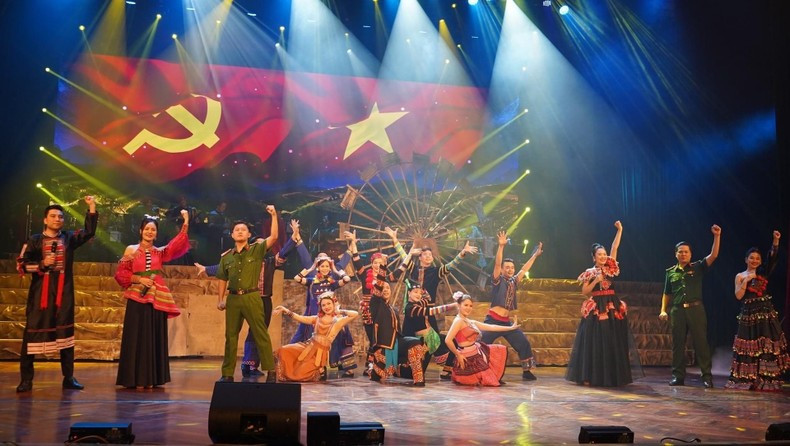 |
| The song “With the Party’s Light, We Move Forward” is performed by the Sao Mai ensemble during the awards ceremony for the contest on defending the ideological foundation of the Party. (Photo courtesy of the composer) |
Q: I believe that the awards that recognise your success in politically themed music must bring you great joy. But they likely also prompt reflection about your next steps in professional development while continuing with this theme?
A: Writing about major themes requires a composer to have conviction, experience, and the courage to avoid dogma, while still maintaining a high level of artistry. When lyrics and melodies are the crystallisation of genuine emotions, no matter the theme, the song can still find a lasting place in the audience’s heart. I truly believe in that.
Thank you very much!
